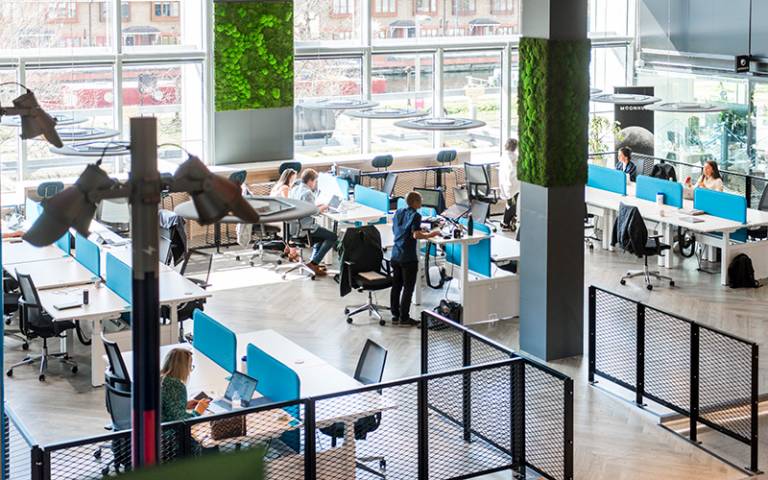The UK’s first specially designed community for disability-focused innovators
The East London Inclusive Enterprise Zone has shown just what’s possible when disability-focused entrepreneurs have access to the support they need to grow.

21 September 2022
In 2019, UCL formed a consortium with 12 partners to create something new for inclusive innovators: the East London Inclusive Enterprise Zone (ELIEZ).
The purpose-built community opened the door to a new model of business support for disabled entrepreneurs or businesses focusing on disabled people.
Thirty fledgling businesses, all with a shared focus on inclusive innovation, received a wide range of support, training and mentoring. The entrepreneurs also had access to a specially-designed accessible co-working space at Plexal at the heart of the Queen Elizabeth Olympic Park in East London.
Many of the businesses who took part have gone onto launch innovative new products and services for the disabled community, including:
- Huru, a digital platform that allows families that no longer live together to communicate, collaborate and look out for each other.
- Patchwork Hub, a remote working platform that’s leading a culture change in work and accessibility.
- Mumbli, a hearing wellness platform that transforms social spaces so that everyone can hear and be heard.
- More Human, an events platform that makes it easy for anyone to organise and deliver a premium social experience.
Filling the gap for inclusive innovation
Disabled people make up 15% of the global population. However, they’re frequently excluded from the opportunities afforded to non-disabled people.
ELIEZ was set up to address the pressing need for specialised provision in the UK to support inclusive entrepreneurship.
The entrepreneurs’ programme ran from January 2020 to March 2021.
The project was delivered by various partners and collaborators, co-producing content and workshops, including:
- UCL
- Greater London Authority
- Here East
- Plexal
- Global Disability Innovation Hub
- London Legacy Development Corporation
- Disability Rights UK
- London College of Fashion
- Loughborough University London
- Hackney Council
- Capital Enterprise
- Ford Mobility
- Inclusion London.
The £1.2 million project received £509,000 from Research England, with match funding and in-kind contributions from the partners.
A thriving community of entrepreneurs
Recognising the barriers disabled entrepreneurs can face, ELIEZ members were given access to a dedicated accessible accelerator programme, mostly taking place during the height of the COVID pandemic in the UK.
Alongside unlimited support from the network, the cohort benefitted from mentoring and workshops on everything from funding to social media.
The Plexal co-working space was re-developed, with support from UCL and Disability Rights UK, to be more inclusive. The building now has quiet pods, adjustable desks and sockets that can be easily reached by people in wheelchairs.
Adapting the support through the pandemic
Although the original intention was to provide support face to face, COVID resulted in ELIEZ running its workshops online.
“We implemented best practice for online meetings,” explains Bhavna Malkani, ELIEZ project lead with UCL Innovation & Enterprise. “This included following guidelines for the optimal use of British Sign Language interpreters, adapting presentations to benefit people with visual impairments and following advice for how to chair meetings to better support neurodivergent attendees.
“It’s been very positive and motivating to be part of a project where all partners were working together to help solve complex social and economic challenges faced by the disabled community.
“By addressing challenges such as optimising accessibility in a workspace and having accessible programming, ELIEZ exemplified how we, as a society, should be implementing all programmes for all startups and entrepreneurs, ensuring inclusivity is at the heart of the delivery. This not only creates new market sectors but also helps stimulate local economies and improves productivity for all.”
Other resources that came out of the programme included an Accessible Social Communications Guide and the Inclusive Innovators podcast. At the end of the programme, all the entrepreneurs had the chance to pitch their business ideas to industry experts and funders.
Emma Lawton, Duncan Lindsey and Mel Nurse, Co Founders of More Human said: “ELIEZ has helped us make crucial connections with potential partners and customers, and keep accessibility front of mind. Having a space to call our own, and being part of a cohort, has given us a lot of confidence as a young business.”
Andrew Roughan, CEO of Plexal, said: “Being a founding partner of ELIEZ has helped Plexal fulfil its ambition as a purpose-led innovation centre. Within the physical space at Plexal, our partnership with ELIEZ has supported our investment in becoming not just a compliant solution for those with accessible needs, but one who sets the benchmark. In our Innovation Services team, ELIEZ has supported our efforts in disability-led innovation where we support large organisations and public sector bodies to design for the extreme use case in order to include all.”
Links
Outputs from ELIEZ:
- ELIEZ showcase and celebration brochure (PDF)
- Inclusive Innovators podcast
- Accessible social communications guide
Find out more about:
- Support for external organisations to partner with UCL
- Mumbli – the startup transforming social spaces so everyone can hear and be heard
- How Here East has become the home for disability-led innovation
- Celebrating disability-led innovation
- Plexal
Photo © Plexal
The project was delivered by the Business Innovation Partnership team (BIP), part of UCL Innovation & Enterprise, in close collaboration with the consortium partners, and funded by Research England’s University Enterprise Zone (UEZ) scheme.
 Close
Close

